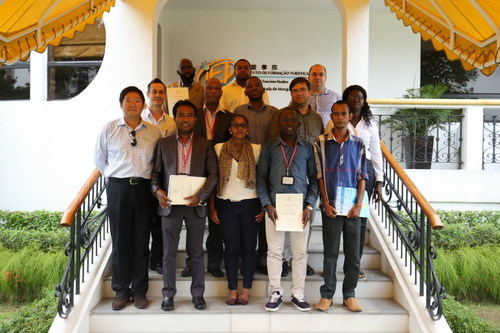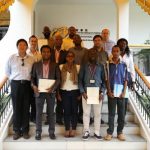 Participants took a group photo with the lecturers.
Participants took a group photo with the lecturers.
The Institute for Tourism Studies (IFT) hosted again on 14 July a workshop on crisis management in hospitality operations that was aimed at representatives of tourism and culture related government bodies from Portuguese-speaking countries. The workshop was part of the ongoing work by IFT to support the Macao SAR Government’s efforts to promote the city as a commercial and trade co-operation service platform between China and Portuguese-speaking countries. It was the second time IFT hosted a training workshop tailor-made for representatives from Portuguese-speaking countries. In June, the Institute conducted the first training workshop on tourism planning and development while a study tour to several tourism attractions in Macao to discuss the tourism planning strategies relevant to the attractions was arranged. The programme was headed by IFT Lecturers Grant O'Bree and Miguel Oliveira. The workshop was divided into 2 sessions. In the morning part, participants discussed the guiding principles of crisis management, rooms divisions and food and beverage operations; and related marketing, management of F&B operations. During the afternoon, the group and the lecturers conducted a study tour to Galaxy Macau integrated resort to inspect and discuss the respective room operations and F&B operations strategies relevant to the establishment. The 9-strong group was in Macao at the invitation of the Macao Government Tourism Office (MGTO) for this training opportunity. Delegates are civil servants in tourism and culture areas in Mozambique, Cape Verde, Republic of Angola, East Timor, and Republic of Guine-Bissau. Earlier on October 12, 2015, Macao SAR Government and the World Tourism Organization (UNWTO) signed a Memorandum of Understanding in Macao. The objective was to enhance cooperation between the two parties in improving the quality of human capital and increasing the competitiveness of tourism destinations (particularly in the Asia Pacific Region) in order to achieve sustainable tourism development. The Global Centre for Tourism Education and Training, soon to be set up by the Institute for Tourism Studies (IFT), Macao is tasked with the responsibility to organise training and education programmes, and other projects in collaboration with UNWTO, to achieve the objectives set out in the Memorandum. In the future, IFT hopes to continue providing training courses targeted to representatives of Portuguese-speaking countries, with the aim of enhancing exchanges and mutual learning between Macao and Portuguese-speaking countries in the field of tourism. Established in 1995, the Institute for Tourism Studies, Macao (IFT) offers the most extensive selection of tourism and hospitality related bachelor degree programmes in Macao, and about twenty thousand participants attend its vocational and professional training courses annually. IFT collaborates with 97 universities and tourism organisations around the world, and builds strong links with 500 leading tourism and hospitality corporations to offer internship opportunities to its students. Being the first institution accredited by the UNWTO.TedQual Certification System for tourism education, IFT has now 7 bachelor degree programmes with the Certification. Currently, the Institute has the most number of bachelor degree programmes certified under the System of any tertiary education establishment worldwide. IFT has received the Medal of Merit in Tourism from the Macao SAR Government, and won twice the Gold Award in ‘Education and Training’ from the Pacific Asia Travel Association (PATA).


